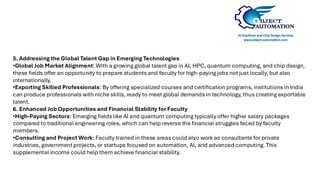Empowering Engineering Faculties: Bridging the Gap with Emerging Technologies
- 2. Object automation with AI, chip design, HPC (High-Performance Computing), and quantum computing can be pivotal in addressing this crisis by reshaping the curriculum, upskilling faculty, and aligning academic institutions with emerging industry trends. Here's how these fields can help: 1. Creating Demand for New Skills •New-Age Curriculum: By offering courses in cutting-edge areas like AI, chip design, HPC, and quantum computing, institutions can cater to the growing demand for skills that are highly relevant to current technological advancements. •Attracting Enrollments: Courses focused on these emerging fields can attract students who might otherwise shy away from traditional engineering disciplines, thereby stabilizing or increasing enrollment numbers. •Diverse Career Paths: These fields open up career paths in rapidly growing sectors, such as AI-driven automation, semiconductor manufacturing, and quantum computing research, providing students with skills that are in demand globally. 2. Upskilling Faculty •Faculty Retraining Programs: Professors from traditional engineering backgrounds can be reskilled to teach advanced courses. For instance, a civil or mechanical engineer could be retrained in data analysis, computational modeling, or AI applications within engineering fields. •Hands-On Training with HPC and Quantum Labs: Using High-Performance Computing and quantum simulation labs, faculty can gain practical experience, enhancing their teaching capabilities in complex computational topics. This aligns them with industry needs and improves their job security and potential for higher earnings. •Cross-Disciplinary Expertise: Faculty can leverage their foundational knowledge in traditional engineering and incorporate it into courses on topics like AI-based simulations, chip design for IoT devices, or automated systems for
- 3. 3. Collaborative Industry Projects and Research •Research Partnerships: Institutions could partner with tech companies or government agencies to conduct joint research in object automation, AI, and semiconductor technology. This collaboration could provide funding and research opportunities for professors, turning academic expertise into valuable industry projects. •Internship and Apprenticeship Programs: With industry partnerships, students and professors can be placed in internships or apprenticeships focused on practical, in-demand skills, making them more employable and relevant in the job market. •Innovation Labs and Startups: Universities can create startup incubators or innovation labs focused on AI and chip design, enabling professors and students to work on real-world projects and even launch tech startups, creating alternative revenue streams and career options. 4. Aligning with the Government’s Digital Initiatives •Government-Backed Initiatives: By aligning with national digital initiatives like Make in India for chip manufacturing and Digital India for AI and IoT adoption, institutions can access funding and support, helping them transition to these in-demand fields and secure government grants. •Local Skill Development Programs: Governments can fund skill development initiatives focusing on AI, HPC, and quantum computing, designed to retrain affected faculty and help students build competencies in these areas. Such programs can contribute to developing a highly skilled workforce for India's growing digital and semiconductor economy.
- 4. 5. Addressing the Global Talent Gap in Emerging Technologies •Global Job Market Alignment: With a growing global talent gap in AI, HPC, quantum computing, and chip design, these fields offer an opportunity to prepare students and faculty for high-paying jobs not just locally, but also internationally. •Exporting Skilled Professionals: By offering specialized courses and certification programs, institutions in India can produce professionals with niche skills, ready to meet global demands in technology, thus creating exportable talent. 6. Enhanced Job Opportunities and Financial Stability for Faculty •High-Paying Sectors: Emerging fields like AI and quantum computing typically offer higher salary packages compared to traditional engineering roles, which can help reverse the financial struggles faced by faculty members. •Consulting and Project Work: Faculty trained in these areas could also work as consultants for private industries, government projects, or startups focused on automation, AI, and advanced computing. This supplemental income could help them achieve financial stability.
- 5. Reach us hr@object-automation.com at +917397784815/+1 914 204 2581 to setup an hour discussion about creating a fantastic career Faculties/professionals.




